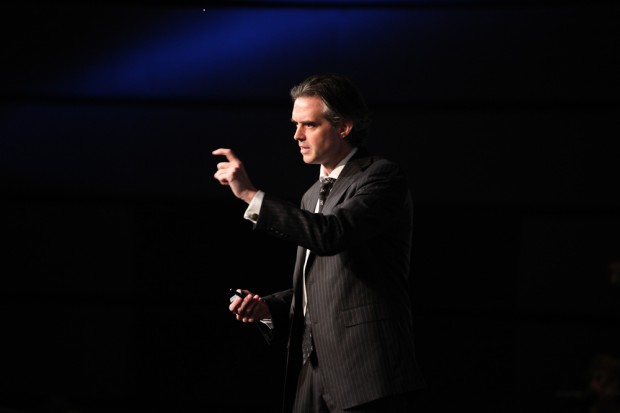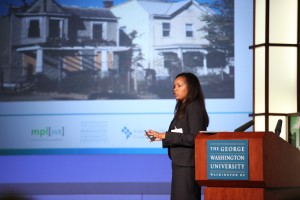Video: Can a TEDTalks-Like Event Boost Ward 8 Employment?

William Atkins / Courtesy of The George Washington University
George Washington University's School of Business dean Doug Guthrie talks (using a wireless mic) about how international investment can boost job creation in Ward 8.
There’s a serious unemployment divide in the District. Some areas have jobless rates as low as 3 percent, and others — like mostly black Ward 8 — have rates as low as 20 percent.
So what’s needed to boost employment in Ward 8? A jobs czar? Bridges and more development? How about having international experts and local activists talk about innovative, new ideas to spur job creation? You know, kind of like TEDTalks, but with a Ward 8 twist.
That’s kind of the idea behind the Major Projects Lab: Ward 8‘s job summit, the result of a partnership between The George Washington University’s School of Business and the Washington, DC Economic Partnership. The summit, held Tuesday at the university’s Foggy Bottom campus, focused on job creation in Ward 8.
Speakers didn’t delve deeply into the “complex social pathologies” that exacerbate and create unemployment disparities — literacy, adult male incarceration, teen pregnancy — because, as WDCEP’s president Steve Moore said, “all it does is solidify the thinking that we [already] have about how to go forward and how we think about economic development change. It seems like it justifies programs that have existed already and haven’t been all that damn successful.”
Scott Osman, an international expert on corporate social responsibility who talked about getting multinational corporations to fund social projects in Ward 8. GWU law professor Susan Jones talked about an e-lawyer bank that would use the Internet to connect pro-bono lawyers and ex-convicts. Mayor Vincent Gray touted future development projects and his One City One Hire program to encourage employers to hire District residents.

William Atkins / The George Washington University
Catherine Buell, D.C.'s Historic Preservation Review Board chair, speaks about the pride her neighbors have and how preserving blighted homes has improved the community.
And then there was sociologist Sudhir Venkatesh, author of Gang Leader for a Day, who challenged notions about the underground economy. He spoke about everyone from alleyway mechanics to people who cut hair — all off the books — and how the community self-regulates disputes between people in the underground economy.
“Think about the people in Ward 8 who have this skill, the people who solve conflicts, the kinds of things they do and you don’t think about in terms of a strength, and you may in fact think of as a liability,” he said.
GWU’s business school dean, Doug Guthrie, urged attendees “not to forget about the international economy and manufacturing,” and to not be afraid of getting other countries, like China, to locate firms and create jobs in Ward 8.
“Most people think of Washington as a lobbying town,” he said. “But it’s also useful and important as a place where, if you create jobs, you get good political visibility, just by doing good in this economy.”
The event put forth a number of good ideas, and perhaps will inspire some to rethink how they approach job creation in Ward 8. But, as Ward 8 resident and chair of the District’s Historic Preservation Review Board Catherine Buell said, “There’s a sense that Ward 8 has been studied time and time again… People come in and have the best of intentions. They have the statistics and yet they’re greeted with a great amount of skepticism. And it’s because you have to know the community history.”
See the summit videos (parts 1 and 2) below:
Video streaming by Ustream
Video streaming by Ustream





